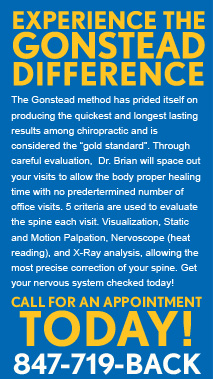Top 10 Reasons To See Your Chiropractor
In honor of National Chiropractic Month we would like to remind you why it is important to see your Chiropractor.
CHIROPRACTIC:
#10: Alleviates Pain
#9: Prevents Other Conditions
#8: Boosts Productivity
#7: Improves Cognitive Function
#6: Boosts Immunity
#5: Reduces Stress
#4: Care Encourages Increased Physical Activity
#3: Reduces Dependency on Medications
#2: Improves Sleep Quality
And the #1 reason to see a Chiropractor is…
#1: Chiropractic Adds Life and Improves Wellness.
#10: Chiropractic Alleviates Pain – Chiropractic addresses the underlying cause of pain disorders, headaches, low back pain and sports injuries by treating the cause, not covering the symptoms. Quite often those painful conditions are linked to dysfunctional areas in the spine known as vertebral subluxations – where movement is restricted or spinal bones are misaligned. Chiropractors adjust vertebral subluxations and this alleviates the pain.
#9: Chiropractic Prevents Other Conditions – Disorders that may be helped by chiropractic range from infantile colic, ear infections and behavioral problems to PMS, acid reflux, numbness/tingling in extremities, high blood pressure and Parkinson’s disease. It is well understood that vertebral subluxations affect nervous system functioning. Along with the brain, the spinal cord is the main component of the central nervous system, which controls nervous system functioning throughout the body and supplies nerve energy for all the body structures and organs. Many patients who present to Chiropractors for treatment report positive changes in other areas of their health as well.
#8: Chiropractic Boosts Productivity- Since Chiropractic care keeps you healthier, you will also find that your efficiency at work increases. For instance, Chiropractic care rids lower back pain associated with sitting hour after hour in ergonomically incorrect chairs. Sitting causes the pelvis to rotate backwards and causes a reduction in the lumbar curve and knee angle. Treatment also causes an increase in muscle effort and disc pressure. Low back pain can lead to work absence and higher medical costs. Studies prove that employees receiving workers compensation due to low back pain who are receiving spinal adjustments experienced greater reduction in pain and disability. This translated into lower therapeutic costs and a faster return to work. Chiropractic care effectively restores proper spinal alignment and reduces lower back pain. Missing appointments however, may foster a “one step forward, two step back” scenario.
#7: Chiropractic Improves Cognitive Function- Mapping of brain activity before and after chiropractic adjustments of the spine and the neck reveals that chiropractic care stimulates cognitive function. In a study involving 500 adult volunteers, researchers used cutting edge technology to create maps of functioning in the cortical portions of the brain before and after chiropractic adjustments of the cervical spine. Researchers found that “cervical adjustments activate specific neurological pathways” in the brain, potentially stimulating cognitive function. The study showed that Chiropractic adjustments also enhances response mechanisms in the brain.
#6: Chiropractic Boosts Immunity – Scientific research reveals that regularly scheduled chiropractic care may boost the body’s immune response. And a powerful immune system is a key component of chiropractics all-natural approach. Your Chiropractor can also give good sound advice on nutrition, vitamin and mineral supplements that boosts immunity too.
#5: Chiropractic Reduces Stress – Chiropractic care reduces stress by allowing the body to achieve a balance. In addition, chiropractic helps keep patients free of the impairments which can prohibit regular exercise, which is key to reducing stress and preventing stress-related anxiety and depression. Chiropractors do not treat depression but research demonstrates that chiropractic adjustments may ease depressive symptoms by increasing endorphins. It has been long speculated that chiropractic interventions may affect mental health problems. Investigators followed 15 adult patient who were both clinically depressed and had cervical spine subluxations. Before and after receiving an adjustment, the subjects completed a standard assessment for depression called the Beck Depression Inventory. Results revealed a marked reduction in depression scores following treatment.
#4: Chiropractic Care Encourages Increased Physical Activity – New patients frequently find that chiropractic care jump starts them toward a more wellness oriented lifestyle, simply because they can move more and with less pain. For instance, many chiropractic patients report improved function and with that, an increased ability to stick to a regular exercise program.
#3: Chiropractic Reduces Dependency on Medications – Individuals who maintain regular chiropractic care are far less likely to overuse medication, which all have dangerous side effects. Even OTC pain medication may cause problems in the gastrointestinal system. In addition, long term use of pain medication can actually worsen the very symptoms they were intended to reduce – a “rebound” reaction. “Rebound” headaches are relatively new, and describe a long standing, “unnamed” and largely unrecognized condition caused by taking painkillers daily or on a regular basis for migraines or other headaches. Remember, these conditions are common, they are not normal.
#2: Chiropractic Improves Sleep Quality – Chiropractic patients often enjoy improved quality of life, including sleep quality. This is due to a reduction in pain and anxiety which often interferes with sleep patterns. Improved sleep enhances immunity and your ability to fight disease.
And the #1 reason to see a Chiropractor is…
#1: Chiropractic Adds Life and Improves Wellness – Regular chiropractic care instills patients with a sense of “health-confidence”. Patients learn to take charge of their own well being , and in turn, increase their longevity and add a heightened quality of life.
So, the question isn’t, “Do you see a chiropractor?”, but…
“Who’s YOUR Chiropractor??”
